Looking for challenging, well-paid job opportunities – or wanting to run your own business? A degree in Economics from the University of Otago will give you the edge!
Read about some of our Economics graduates:
Susie Campbell
MEcon
"My studies at Otago definitely helped prepare me for what has come my way.”
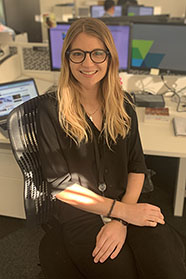 Otago's flexible course structure was a big draw for Susie Campbell, who grew up in Chile and originally came to Dunedin for undergraduate study.
Otago's flexible course structure was a big draw for Susie Campbell, who grew up in Chile and originally came to Dunedin for undergraduate study.
“Otago helped arrange the transfer from a different academic background and even validated some credits, making the move very simple.”
Susie says the city offered plenty of opportunities for fun outside of her studies. “With lots of beaches close by and so many keen people around, there was always someone down for a trip to the beach or a game of badminton. I joined an athletics club which was a good way to get settled, and I was involved in one of the local churches which made Dunedin feel like home very quickly.”
After completing her MEcon, Susie moved to Santiago to intern at the Economic Commission for Latin America and the Caribbean (ECLAC), the Latin American headquarters of the United Nations.
“I was hired by the International Trade team at ECLAC after my internship, where I was able to work on some fascinating projects. I then moved back to New Zealand and have since been working in the Trade and International team at the Ministry of Business, Innovation and Employment. As part of my degree, I studied the economics of international trade, so my studies definitely helped prepare me for what has come my way.”
Kelvin Woock
BCom, MEcon
Studying for a Master of Economics at Otago gives you a competitive advantage when looking for a job.
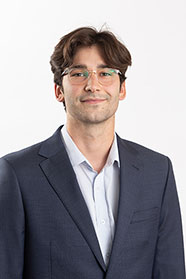 "After completing my Bachelor of Commerce degree at Otago, it felt natural to continue into postgraduate study alongside people I enjoyed working and socialising with.
"After completing my Bachelor of Commerce degree at Otago, it felt natural to continue into postgraduate study alongside people I enjoyed working and socialising with.
I really enjoyed learning about many different avenues of economics and seeing the variety of research interests that are available to explore – and it was great to see the academic staff excited about their particular niche.
The two things I most enjoyed during the course were looking at applications of Game Theory in real life, and being given a hands-on research opportunity looking at the implications of beer franchise laws on the number of breweries in the United States for my thesis.
I'm currently an Economic Consultant at Sapere, working on many different projects in health and public policy areas. These projects require clear problem definition and a detailed intended course of action to arrive at the output the client wants. The Master of Economics course taught me how to successfully define the parameters of a problem and identify the steps that need to be taken to deliver robust solutions to the argument. I also learned analytical thought processes, theories, econometrics skills and communication skills.
Studying for a Master of Economics at Otago gives you a competitive advantage when looking for a job. It certainly opened the door for me at Sapere. It builds necessary strong analytical skills, which set you up perfectly for a range of graduate roles and hones your ability to communicate ideas in informal and formal settings."
Kelvin recently completed his Master of Economics at the University of Otago, where he made the Otago Business School Dean's List.
Vivienne Rijnberg
BCom Economics, MEcon
"The Department has some really helpful and passionate staff who were always happy to help out students".
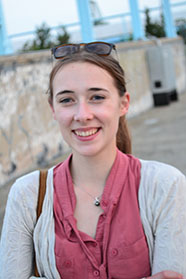 Hailing from Christchurch, Vivienne didn't have to travel too far south to attend the University of Otago. Having never studied economics before, she was intrigued by "how you could use mathematics to explain human decision making". Upon arrival, Vivienne found the Department of Economics fantastic.
Hailing from Christchurch, Vivienne didn't have to travel too far south to attend the University of Otago. Having never studied economics before, she was intrigued by "how you could use mathematics to explain human decision making". Upon arrival, Vivienne found the Department of Economics fantastic.
Living in Dunedin has been a highlight for Vivienne who loves the beautiful spots around the city "from the Botanic Gardens right next to the University, to the Peninsula with its wild beaches". She also loves "how well the city and University cater for their students".
Through studying economics, Vivienne was able to travel to Shanghai for one month over summer as part of a Summer School course and found the experience really enjoyable.
After undergraduate studies, she worked in the USA for a year before returning to Otago to complete a Master's in Economics. Since then Vivienne has worked as a data analyst for the University of Otago in the Department of Public Health as well as in government. She found that, through studying economics, she built up statistical skills "which are essential for data analytic roles in any field".
Vivienne is about to commence a role with PHARMAC as a health economist, a role which "supports PHARMAC's mission of achieving better health outcomes for New Zealanders" and involves modelling the cost-effectiveness of new pharmaceuticals and medical devices.
Rachel Malden
BCom
"Otago degrees are definitely well recognised by employers. My degree has given me a good base knowledge and taught me a lot about work ethic and time management."
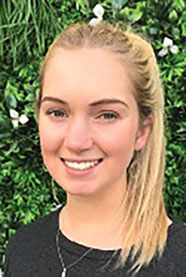 For Rachel Malden, the decision to study at Otago was "a bit of a last-minute decision". Receiving a scholarship, coupled with the desire to live away from home and meet new people, was the push she needed. "I was a bit unsure if I would like Dunedin, but I've never looked back."
For Rachel Malden, the decision to study at Otago was "a bit of a last-minute decision". Receiving a scholarship, coupled with the desire to live away from home and meet new people, was the push she needed. "I was a bit unsure if I would like Dunedin, but I've never looked back."
Rachel first enrolled in a double degree: BCom majoring in Finance and BSc majoring in Genetics, then narrowed it down to a BCom with a double major of Economics and Finance. "I found a passion for economics at the end of first year."
Surprised by the wide range of Economics papers available, Rachel's favourites were the Behavioural Economics and the Economics of Health and Education papers. The lecturers in the Department of Economics proved to be friendly and approachable, and "a bit quirky. The Head of Department is known for wearing jandals and Hawaiian shirts". A fun atmosphere permeates the Department; "I don't think many departments would have lecturers singing Billy Joel and playing the piano at their prizegiving."
Rachel's biggest highlight so far has been attending a Summer School program in Shanghai with nine other Otago students. "It gave me the opportunity to experience another culture and I made some friends for life on that trip." She has enjoyed the student culture at Otago and living "a short drive to some of the nicest beaches in the country is pretty cool".
Next year Rachel will be starting a graduate position at PwC, as an analyst in the Finance and Economics team in the Consulting Division.
Finn Robinson
BSc Economics, BA, MEcon
“Economics is more than just numbers and graphs. It's a framework for thinking about the world in a rational way.”
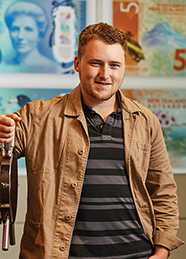
Studying Economics is an eye-opening experience, says Finn Robinson.
“Doing an Economics degree at Otago exposes you to many interpretations and explanations of how the world works. You'll find you are able to understand the behaviour of businesses, governments and households, and critically evaluate their actions.
Finn, who has a Bachelor of Arts in Politics, a Bachelor of Science in Economics and has recently completed a Master of Economics, is a firm believer in students trying papers outside their major discipline.
“I started taking Economics in my second year after realising how well it complemented what I was learning in my Politics papers. If I hadn't tried Economics, I wouldn't have the job or knowledge I have today.”
During his studies Finn also completed a three-month summer internship at the Reserve Bank of New Zealand where he is now employed as an Economic Analyst in the forecasting team.
“My degree is essential to being able to do this job. To be able to carry out forecasts and rationalise the results, you need a degree with a strong quantitative focus that gives you a solid understanding of macroeconomics,” he says.
“The University of Otago has a great reputation. I expected to learn a lot and be pushed to achieve a lot, and my expectations were far exceeded. I've learned more than I ever imagined and have gone in directions I never conceived of whilst at high school.”
Corey Allan
BCom in Economics (Hons), Master of Commerce in Economics
“Economics is a much more diverse subject than people realise – it can be used to analyse environmental problems, development and a wide range of human behaviours.”
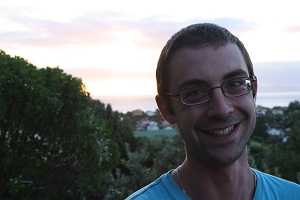
Corey Allan was invited into the Economics Honours programme at the end of his first year – and never looked back! “Economics was the subject I enjoyed the most and staff enthusiasm for this field was infectious,” he says.
Corey was fascinated to learn about the range of issues to which economic concepts can be applied. “Economics offers a unique way to look at, and think about, the world. This really appealed to me.” He also loved the research element of the honours programme – so much so that he stayed on to do his Master's.
The best moment of his degree was handing in his honours dissertation. “After all the work that went into designing the project, delving into the literature, doing the analysis – it was a great relief to see it all come together into a polished piece of research.”
Corey makes a special mention of the Department of Economics staff and their dedication to the subject. “They were always willing to help you through any issues you were having with the course,” he explains. “The lecturers did a really good job of using real world examples of economic theories in action. They placed a lot of emphasis on practical skills that I apply in my job on a daily basis.”
Where has all Corey's hard work led?
He is working as a research analyst for Motu Economic and Public Policy Research, an independent, not-for-profit research organisation, in Wellington. At Motu, his main area of work is 'the economics of climate change'.
Élodie Blanc
PhD in Economics
“I was attracted to Economics because it provides a robust framework for evaluating choices and is applicable to a wide range of situations”.
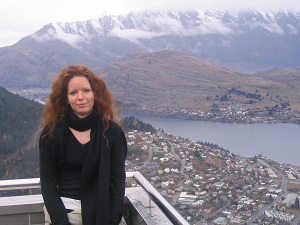
Élodie Blanc made the 'right choice' with a PhD in Economics from the University of Otago. She is currently employed at Massachusetts Institute of Technology (MIT), as a Research Scientist on the Joint Program on the Science and Policy of Global Change. Her work involves research into environmental issues, with a focus on how climate change will affect crop production and yields, and water availability and use.
Élodie developed a number of capabilities at Otago that have been invaluable in her current role. “During my time at Otago, I was able to develop specific skills related to my thesis topic”, she explains, “such as panel data techniques, and a framework for critical thinking and problem solving.” Her presentation skills, and confidence, grew through speaking at departmental seminars and international conferences.
Élodie appreciated the academic freedom offered to postgraduate students by the University of Otago. She also enjoyed the support provided to students, both in terms of the Faculty willingly making their time available, and resources provided by the University. A real bonus was the supportive and pleasant working environment found within the Department.
“The best moment of my Economics degree was the sense of accomplishment upon finishing my thesis, and grasping techniques that seemed incomprehensible to me when I started my studies.”
What advice would Élodie give to other students considering studying Economics at Otago?
“Enjoy your time in Dunedin – it will be over before you know it! Take advantage of the many opportunities that the University, and the region, have to offer.”
William Cheyne
BCom (Hons) in Economics, LLB (Hons)
“Studying Economics and Law together is definitely an advantage as it broadens your understanding of the institutions that drive economic activity.”
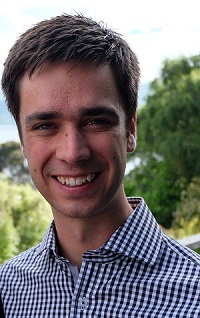
What appealed to William Cheyne the most about Economics was the “breadth of the subject.” He first became interested at high school, and after completing first year Economics papers at Otago, knew this subject was for him.
William graduated with two honours degrees, in Economics and Law – a combination he recommends. In addition to the obvious crossovers between the two disciplines, such as competition law and industrial organisation, William feels that both Economics and Law emphasise thinking in a structured and methodical way about problems. “Economics,” he says, “has something to say about most of the big issues facing the world.”
A highlight of his Economics degree was the range of Economics papers on offer – he only wishes he could have taken more of them! He also enjoyed “finding lecturers who shared my passion for a topic and were willing to have great discussions about it, and having my eyes opened to subjects that I hadn't previously known much about – by real experts in that area.”
During the last semester of his degree, William took a 'Public Choice' paper that he particularly enjoyed. “We had some great discussions about everything, from the value of freedom to how to determine voter preferences.”
William is keen to return to Economics in the future – possibly to study Behavioural Law and Economics. “There are a huge range of viewpoints within this field,” William explains. “From those who would like to gently remodel traditional law and economics to take account of mistakes or biases; to those who see behavioural economics as calling for a large scale overhaul of our political and legal systems. I would like to be part of the debates.”
Auren Clarke
Master of Business (MBus), Economics, Distinction
“There's a great group of lecturers in the Department of Economics. Being able to work with them on projects, and see the angles that their experiences brought, was truly insightful.”
The quality of teaching and research available at Otago's Department of Economics was a great drawcard for Auren, who received his first formal taste of Economics education in his third form year at high school. From an early age, he had found that the rational and sensible approach to problem solving adopted by Economics aligned well with his own intuitive approach to many situations. Indeed, he soon found himself incorporating economic concepts into his everyday life!
For Auren, studying Economics at University was the only choice, and having a great time while studying was a real bonus. He really enjoyed the company of his fellow Economics students. “Having a great group of people around made the experience a lot of fun,” he says. Auren is also full of praise for University of Otago itself – “it's an amazing place to study.”
The best moment of his degree was the realisation that he had completed his Master's in Economics, and was now in a position to realise his employment goals, after all his efforts. “There's not a lot that is more satisfying than being rewarded for hard work,” says Auren.
These days, Auren can be found working in the labour market team at Statistics New Zealand. He is currently working on the Household Labour Force Survey, which provides official statistics on employment in New Zealand. In the coming months, he will be moving into another team within Statistics New Zealand.
So, did his Economics degree from Otago prepare him well for the workforce? Absolutely!
In Auren's opinion, Economics provides a great foundation for approaching and solving many difficult problems. “And usefully,” he adds, “I don't believe that its relevance is confined to a particular set of industries and occupations.”
Alvin Etang
PhD in Economics
“Otago's Department of Economics is awesome!”
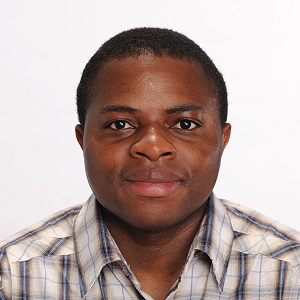
Alvin Etang is full of praise for the University of Otago. He was particularly impressed by the friendly and supportive atmosphere he encountered around the Department of Economics, the School of Business, and the University of Otago in general. “Living several thousand miles away from your family can be difficult. I didn't know anybody in New Zealand before moving to Dunedin, but it didn't take me long to call it 'home'.” The University's student-focused approach helped him to settle in quickly too. “At Otago, students are at the centre of literally everything,” he says.
The same excellent support continued throughout the course of his PhD studies, and he remembers his supervisors with fondness. “I enjoyed an excellent professional and personal relationship with my supervisors and learned a lot from them. I couldn't have asked for better supervisors.”
Alvin's Economics degree equipped him with all the essential skills for his current job, including questionnaire design and implementation, and data analysis. “I am now dealing with much larger surveys,” he says, “but many of the skills I acquired during my studies apply to every survey regardless of its size.” The value of strong teamwork and presentation skills was also impressed upon him. Alvin collaborated on research with his supervisors, both during his studies and after graduating. Together, they published some key findings from his thesis, and worked on some new research that was later published in an academic journal.
After completing his PhD, and working as a Research Fellow in the Department of Economics for a year, Alvin joined the staff of Yale University as a Postdoctoral Associate. From there, he moved on to his current position at the World Bank, where he is based at the Bank's headquarters in Washington DC.
His work includes managing the 'Listening to Africa' initiative – an approach to data collection that involves using mobile phone technology to collect high frequency data for welfare monitoring across African countries. “There is a lack of updated, meaningful poverty estimates in the continent,” he explains. “This has a negative impact on poverty reduction endeavours, since policy-makers lack accurate up-to-date data on poverty and welfare. The widespread use of mobile phones offers new opportunities to fill in data gaps at low cost.”
A final word from Alvin to others considering studying Economics at Otago?
“Economics is a beautiful discipline that helps broaden the way you view things in any aspect of life. If you are considering studying Economics at a university where students come first, then Otago is that university.”
Onur Koska
PhD (Economics), AkadR.
“When I was offered my first academic position, I knew that my Economics degree from Otago was leading me where I wanted to be.”
Receiving his first job offer was a high-point for Onur, but his career path hadn't always been so clear. Like many school leavers he wasn't sure what he wanted to study at University, and had deliberately kept his options open by studying a broad range of subjects at school. Finally, a family friend, who was also a professional career advisor, suggested Economics might suit his interests – and he has never looked back since.
Onur really enjoyed his time as a postgraduate student in Economics at Otago. He was given full academic freedom, and received great supervision from his academic advisors. “Not only do they know their economics, but they are also very friendly and helpful, and relish academic debate”. He also appreciated the resources available within the department. This included easy access to study materials, and financial support in the form of scholarships and funding to attend conferences and workshops.
All the hard work paid off when he accepted his first post doctoral position at the University of Würzburg, Germany. Currently, he holds the position of Assistant Professor at the University of Tübingen, where his work involves research and teaching – very similar to what he did for his PhD. “Given the vibrant academic environment at Otago, my transition to the workforce has been pretty smooth,” he says.
Onur plans to further his academic career in the future, and is driven to succeed at the highest level. “I am very determined to become an internationally recognised academic scholar and an excellent teacher.”
Sarah Simmers
LLB (First Class Hons), BCom in Economics (Hons)
“A commerce degree is a perfect fit for someone wanting to be a Commercial Lawyer.”
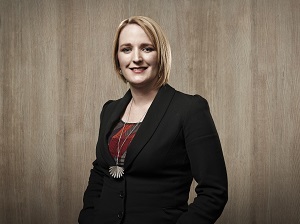
Sarah Simmers is currently a partner at Anderson Lloyd Lawyers in the Commercial Department, where her double degree (Law and Economics) from the University of Otago has been invaluable. She had intended to become an Economist after university, but enjoyed her summer internship with a law firm in Wellington so much, she decided to choose Law as her career path.
Despite this unforeseen change in direction, her Economics degree has been very useful in her legal practice, especially in the area of Competition Law.
“The Commerce Act aims to promote competition in markets for the benefit of New Zealanders,” Sarah explains. “Economic theories and econometric evidence are used to form a view about the effect an arrangement, merger or acquisition will have on competition. Economics also helps you to understand how businesses operate and the driver for a client's decisions.”
Sarah remembers fondly her studies with the Department of Economics. “The lecturers were fantastic,” she says. She particularly enjoyed the collegiality of smaller classes – especially in her Economics Honours year – and still keeps in touch with former classmates. She is also grateful for the opportunity to work as a tutor at 200-level and to mark Economics examinations: “I think tutoring really helped my presenting skills.”
What does the future hold for this successful Commercial Lawyer? “I really enjoy my work,” Sarah affirms, “and see myself here long-term.”